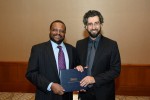When Andrea Moudarres developed his doctoral dissertation at Yale University, he did not expect that it would one day turn into an award-winning manuscript. Moudarres, an assistant professor of Italian at UCLA, was recently awarded the 21st annual Aldo and Jeanne Scaglione Publication Award for a Manuscript in Italian Literary Studies. He received the award for his manuscript “The Enemy in Italian Renaissance Epic: Images of Hostility from Dante to Tasso.” The manuscript examines the question of hostility and how it arises from ideas about politics or religion. Moudarres began developing his manuscript from his Ph.D. dissertation in November 2008. He completed his Ph.D. in 2011 and his dissertation a few months earlier. However, when he started working at UCLA in 2012, he had to take some time away from his manuscript. “When I started teaching I couldn’t dedicate time to the book. My first few years (as a professor) I wasn’t working on the book,” Moudarres said. “After 2015 I was able to come back to the manuscript and revise it significantly.” While the manuscript itself is an original analysis of Renaissance poetry, Moudarres said it is about how political dynamics can lead to conflict at its core. “It’s been said a community can only exist from conflict. I disagree with that,” Moudarres said. “History is what produced enmity but it’s not a necessary condition for human existence.” Paula Krebs, executive director of the Modern Language Association, which issues the award, said the process for selecting recipients is competitive. “The committee reads dozens of books for each prize, from the foremost scholars in their fields,” Krebs said. “We are the premier national organization for language and literary study, so receiving the Scaglione Publication Award for a Manuscript in Italian Literary Studies means that your work has stood out, to a committee of your peers, as the most significant publication in your field this year.” Moudarres is one of several UCLA professors who have received awards from MLA, including Yasemin Yildiz, an associate professor of German and comparative literature, and Lucia Re, a professor of Italian. “I’m happy about it but I consider myself lucky,” Moudarres said. “I don’t think there’s anything particular about my work that makes it better than what other people might have submitted.” Despite Moudarres’ modesty surrounding his achievement, his colleagues said they were not surprised by his win. Massimo Ciavolella, an Italian and comparative literature professor, said he thinks Moudarres is very deserving of the award. “It added to what I already knew that he’s an excellent scholar and excellent person to have in a department,” Ciavolella said. Ciavolella added that Moudarres is a collaborative, pleasant and polite person whom anyone would love to be around. He said colleagues and students in the department were elated to hear he won the award. Moudarres said he hopes his award promotes discussion on whether conflict is an internal or external creation. “The main, original thing about the book is the idea that all conflicts are internal,” he said. “That’s the theoretical approach that has never been used for a Renaissance epic.” Moudarres added he thinks his manuscript will not only benefit his career, but potentially also the Italian department as a whole. “I hope it draws attention to the kind of work that we do, both in premodern literature culture as well as modern culture. Students don’t delve into the scholars that professors do,” Moudarres said. “Hopefully it will help students draw them to the department.” After winning this award, Moudarres said he aims to apply for tenure. “I hope to learn about (whether I’ve received tenure) in the next few months,” Moudarres said. “Then I need a couple of weeks of vacation.” Ciavolella said he has no doubt this is only the beginning of Moudarres’ career. “The prize constitutes a trampoline for what will be a brilliant career,” he said. “I have no doubt at all that – as good as he is now – in a few years, he’ll be one of the best scholars … on Italian Renaissance studies.”
Leave a comment

LOVED IT.